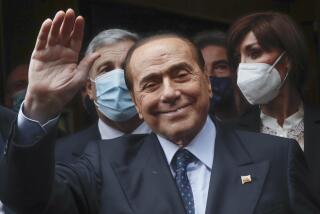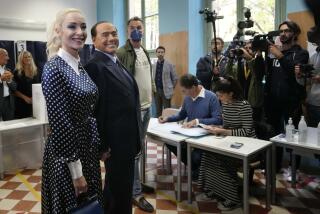Berlusconi Says He Tried to Steer Bush From War
ROME — For years, he has been one of President Bush’s most loyal supporters in Europe, a leader who steadfastly backed the U.S.-led war in Iraq and one of the few on the continent to send troops to help out.
So it came as something of a surprise this weekend when Italian Prime Minister Silvio Berlusconi revealed his reservations about the war, on the eve of a visit to Washington no less.
“I tried repeatedly to convince the American president not to go to war,” Berlusconi told an interviewer with the La7 television channel. “I was never convinced that war was the best system to achieve democracy in a country that had to emerge from a bloody dictatorship. I maintained that military action should be avoided.”
The interview will be broadcast Monday, the day the prime minister arrives at the White House, and excerpts were reported Saturday by Italian news agencies. Berlusconi has made numerous trips to the American capital and has probably received more Bush hospitality than any European leader except Tony Blair.
Facing a tough reelection early next year, Berlusconi may be attempting to distance himself from Bush, who lately has been besieged by an onslaught of crises that have eroded public support. Berlusconi, too, has seen his support sag, in part because of the unpopular war in Iraq as well as worsening economic malaise.
The right-wing coalition of parties that Berlusconi heads is divided, while the normally fractured left seems to be coalescing behind a single candidate, former Prime Minister Romano Prodi, who is leading in polls and poses a formidable challenge to Berlusconi’s rule.
Berlusconi’s comments on Iraq also come at a time of mounting speculation that his government had a hand in forging documents that purported to show that Iraq was attempting to buy uranium in Niger for use in nuclear weapons. The Bush administration cited that claim in building the case for going to war.
The Italian government has repeatedly denied that it or its intelligence services were involved in producing and passing to Washington the fake dossier, which was delivered in 2002 to the U.S. Embassy in Rome by a reporter working for a Berlusconi-owned magazine. The reporter had acquired the documents from an Italian businessman with ties to Italian intelligence who had shopped the papers around to French and British intelligence agencies.
That year, former U.S. diplomat Joseph C. Wilson IV was dispatched to Niger to investigate the claims. After Wilson publicized his doubts about the administration’s case for war, his wife’s identity as a covert CIA operative was leaked. The revelation widened into a scandal that resulted in the indictment Friday of Vice President Dick Cheney’s chief of staff, I. Lewis “Scooter” Libby, on perjury and other charges.
In the last week, the pro-left Italian newspaper La Repubblica ran a series of stories accusing Berlusconi of encouraging the Italian military secret service SISMI to float the Niger claims to Washington. The head of SISMI, Nicolo Pollari, will appear before a parliamentary committee this week in closed session to testify about the matter.
In his comments reported Saturday, Berlusconi also said he had tried to find an alternative to war in Iraq through consultations with Libyan leader Moammar Kadafi. But they failed to do so, he said.
On the eve of the war, in March 2003, Berlusconi went before the Italian parliament to say the military campaign was “legitimate” although Italy would not participate directly. He allowed U.S. bases in Italy and Italian airspace to be used to support attacks on Iraq during the invasion.
Italy has about 3,000 troops in Iraq, all of whom were dispatched after the invasion and the fall of Saddam Hussein. Despite Berlusconi’s promise to begin pulling them out this fall, only a small contingent has withdrawn.
Italy has lost about 30 soldiers. In addition, one Italian journalist was killed and another kidnapped, as were two aid workers. All of the kidnap victims were freed, but a senior Italian intelligence agent was killed by U.S. troops shortly after he helped free the journalist.
Prodi, the opposition leader, has said he will withdraw Italy’s troops from Iraq if elected. On Saturday, he expressed puzzlement at Berlusconi’s newly expressed doubts.
“What is going on?” he said. “Has [Berlusconi] finally agreed that this was a mistaken war? Now he tells us. Has he told Bush?”
More to Read
Sign up for Essential California
The most important California stories and recommendations in your inbox every morning.
You may occasionally receive promotional content from the Los Angeles Times.











